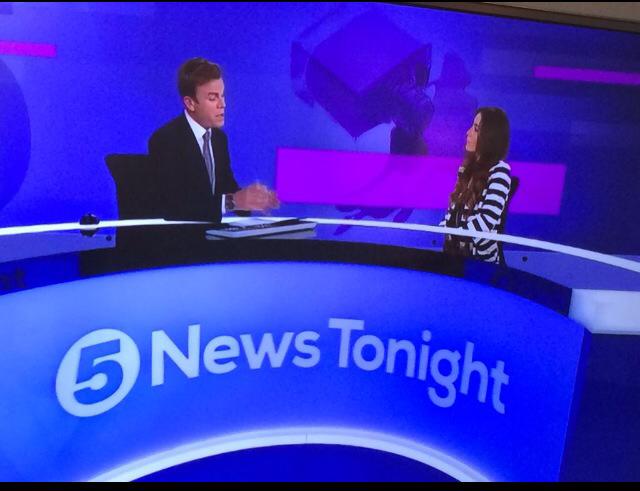 This week a new campaign was launched by The Police Intellectual Property Crime Unit called #WakeUpDon’tFakeUp, when the Daily Mail ran a story about the campaign, I breathed a sigh of relief, I have been talking about fake cosmetics and warning the public about them through my campaign #SafetyInBeauty, to me the news was not new, but very welcome.
This week a new campaign was launched by The Police Intellectual Property Crime Unit called #WakeUpDon’tFakeUp, when the Daily Mail ran a story about the campaign, I breathed a sigh of relief, I have been talking about fake cosmetics and warning the public about them through my campaign #SafetyInBeauty, to me the news was not new, but very welcome.
As a result on Monday evening I appeared on Channel 5 News as a guest expert giving advice on how to run quick checks via brand customer services to verify auction sites sellers and spot fake counterfeit cosmetics, even though my interview was a couple of minutes only, I was grateful for the opportunity to give my point of view.
For those of you that have not seen the campaign official press release, I have it printed for you below, please be aware of the awful ingredients found in counterfeit cosmetics it is simply not worth the bargain, please support the campaign by tweeting #WakeUpDon’tFakeUp and #SafetyInBeauty thank you so much for your support and to The Police Intellectual Property Crime Unit for jumping on such an important issue.
The Police Intellectual Property Crime Unit (PIPCU) have today (18th May) launched an awareness campaign warning consumers of the risks posed by fake beauty products.
In a call for consumers to ‘Wake up – don’t fake up!’ the City of London Police unit is highlighting the dangers of buying and using counterfeit goods such as make-up, perfume, electrical hair stylers and sun-cream.
In the UK it is estimated that consumers spend at least £90 million every year on fake goods (1) and with the popularity of the internet and online shopping, the production and sale of fake goods on the web is increasing. Counterfeit beauty products in particular are becoming increasingly common and easily available on auction sites, online market places, rogue websites and social media.
As we move towards a more digital world, checking the authenticity of a product is proving to be a lot harder, as consumers cannot gauge the look and feel of a product as they did before when buying on the high-street. Generic stock images are also frequently used to deceive consumers into believing they are buying the real deal.
In the last 18 months, PIPCU has helped to protect consumers from being ripped off online by suspending more than 5,500 websites selling fake luxury branded goods as well as seizing more than £3.5million worth of fake goods.
In addition, the percentage of fake goods seized by customs because of health and safety concerns to consumers has doubled in recent years (2). These include items such as perfume, make-up and electrical beauty items.
Fake electrical beauty goods, such as hair curlers, dryers and straighteners are not subject to the same vigorous safety tests as genuine items and so the bogus product is often very dangerous. It could cause electrocution or overheat and catch fire, potentially burning hair, skin and scalp as well as putting homes and lives at risk.
Laboratory tests have shown counterfeit perfume often contains poisonous chemicals including cyanide and even human urine. While fake cosmetics such as eyeliner, mascara, lipgloss and foundation have been found to contain toxic levels of chemicals and harmful substances such as; arsenic, mercury and lead. All of these can cause allergic reactions, such as skin irritation, swelling, rashes and burns as well as leaving the consumer with longer term health problems.
Counterfeit make-up is often produced in un-sanitised and un-hygienic factories and there have been cases where rats’ droppings and poison have also been found in the phoney cosmetics.
In 2014 PIPCU dismantled a criminal operation suspected of importing and selling counterfeit goods. The team seized a shipping container which contained what is believed to be more than 4,700 counterfeit versions of one of the UK’s most popular beauty brands, including foundation, bronzer, lipgloss, eye shadow and eyebrow pencils.
In addition, in 2013, EU Customs seized over a million suspected fake cosmetics and perfume items with a retail value of more than 55million euros (3).
Fraudsters have also been known to knock-up counterfeit sun-cream and pass it off as well known and trusted household brands. However they often contain little or no SPF at all and so offer no protection to harmful UV rays which could lead to long term skin damage, as well as containing substances which could cause irritation to the skin.
In addition, PIPCU is urging online shoppers to be aware that by purchasing counterfeit goods online they are running the risk of their financial and personal details being compromised and being used for other fraudulent scams, as well as exposing their computer to malware and viruses.
City of London Police, Detective Superintendent Maria Woodall who oversees the Police Intellectual Property Crime Unit (PIPCU) said “Many people don’t know about the real dangers counterfeit beauty products pose to their health and so that is why this week we are urging the public to Wake up – don’t fake up!
“Criminals are exploiting every opportunity to fool customers into buying counterfeits in order for them to make some quick cash – putting peoples’ health, homes and lives at risk. Beauty products are meant to enhance your features however the fakes can in fact do quite the opposite. Our general rule is; if it seems too good to be true then it probably is!
“Not only could these products have serious implications to your health and wellbeing but by simply going online and buying from a rogue site or dealer, your personal and financial information is at risk.
“We have had victims who have bought fake items online only to discover later that the criminals behind the site have used their payment details to make further purchases or even use their personal details to set up hundreds of illegal sites selling counterfeit goods.”
Intellectual Property Minister Baroness Neville-Rolfe said: “Counterfeit goods pose a real threat to public safety, steal ideas from businesses and rip-off consumers. That is why the Government is committed to cracking down on fakes and I am delighted with the energy PIPCU is bringing to tackling this issue.
“Buying illegal goods also runs the risk of supporting other activities of organised crime, from drug smuggling to people trafficking. It is never a victimless crime.
“Everyone should follow the advice to make sure they don’t put themselves and others in danger by buying fake goods.”
Electrical Safety First, a charity dedicated to reducing deaths and injuries caused by electrical accidents, is supporting PIPCU’s ‘Wake up – don’t fake up!’ campaign this week.
Phil Buckle, Director General of Electrical Safety First said: “Counterfeit electrical products are dangerous. Time and again we have seen these items overheat, cause electric shocks and even fires. By purchasing and using these counterfeits, even unwittingly, consumers are putting themselves, their families and their property in danger. We understand the desire to bag a bargain, but it is simply not worth the risk just to save a few pounds.”
PIPCU is a specialist national police unit dedicated to protecting UK industries that produce legitimate, high quality, physical goods and online digital content from intellectual property crime.
The operationally independent unit was launched in September 2013 with funding from the Intellectual Property Office (IPO). The unit is based within the Economic Crime Directorate of the City of London Police, the National Policing Lead for Fraud.
Images Credit: – With courtesy of Channel 5 News and Channel 5

